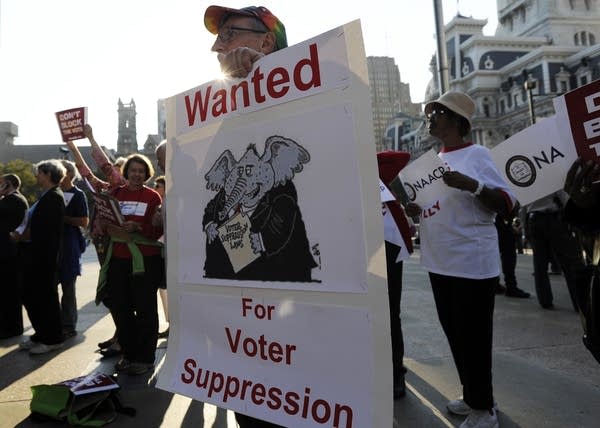Some black leaders say goal of voter ID requirement to suppress vote
Go Deeper.
Create an account or log in to save stories.
Like this?
Thanks for liking this story! We have added it to a list of your favorite stories.

Many opponents of a proposed state constitutional amendment that would require voters to present photo identification at the polls say it unfairly deters minorities, the elderly and students from voting. And some African-American leaders, including U.S. Rep. Keith Ellison, say it amounts to an effort aimed at suppressing support from traditionally Democratic constituencies.
Ellison believes it's no coincidence that the push for voter ID came after the 2008 election of President Barack Obama, who this year is running for re-election against Republican nominee Mitt Romney.
"I think there's a direct relationship between the massive coalition that turned out to support Obama and the response, which is all of these voter ID bills that proliferated throughout the states," Ellison said. "Folks just said look, rather than let low income people, young women, communities of color, senior citizens, veterans, students — rather than let them participate, we'll just pass laws that eliminate their ability to participate."
Turn Up Your Support
MPR News helps you turn down the noise and build shared understanding. Turn up your support for this public resource and keep trusted journalism accessible to all.
VOTER ID SPECIAL COVERAGE
• Vote "yes." It's common sense
• Vote "no." It's a misguided "solution"
• Read the amendment, join the discussion
As their smoking gun, voter ID foes point to a widely-circulated video of Pennsylvania state House Republican Leader Mike Turzai touting a measure in his state as a boost to the Romney campaign. To them, it proves the true intent of such laws.
"Voter ID, which is going to allow Governor Romney to win the state of Pennsylvania- done," said Turzai as he listed GOP accomplishments for a roomful of supporters earlier this year. A Pennsylvania judge on Tuesday postponed the controversial requirement, ordering the state not to enforce it in this year's presidential election but allowing it to go into effect next year.
Ellison said he has seen no evidence of voter fraud, and no reason to impose an extra financial burden on local government.

A 2006 study from the Brennan Center for Justice at New York University School of Law found that 25 percent of African-Americans in the United States of voting age had no government-issued photo identification, compared to 8 percent of whites. Another survey, conducted by a Massachusetts Institute of Technology professor in 2008, found that 19 percent of black respondents nationwide and 3 percent of whites did not have a driver's license.
State Sen. Jeff Hayden, DFL-Minneapolis, said he's well aware of the disparity. Hayden, who is black, said that's why many African American voters consider voter ID an "overt act of racism."
"Now I know that the proponents of it don't consider this to be about race," Hayden said. "But disproportionately, when you look at who this would affect, a lot of people of color would be disenfranchised or not be able to go out and vote."
Amendment supporters argue that no eligible voter will be prevented from voting because the new requirement will also come with a new system of provisional balloting.
Dan McGrath, chairman of the pro-amendment campaign organization ProtectMyVote.com, denied that voter ID laws aim to suppress the black vote.
"Well in order to believe that, you have to believe that some people are less capable than others of obtaining identification, and you have to believe that it has something to do with how much melanin you have in your skin," McGrath said. "And I find the notion ridiculous and offensive."
Other supporters agree. Among them is Chris Fields, a Republican who is challenging Ellison in the 5th District. Fields, who is black, said he thinks the requirement makes sense for improving elections. Fields also said he doesn't believe there's any racism involved in the amendment effort.
"I can approach it from a standpoint as an African-American male and as someone who served in the military for over 21 years," Fields said. "Look, I want my vote to count, and I want every vote to count in a way that is proper and a way that is legal and maintains our electoral integrity."
Still, some voter ID opponents are convinced that the constitutional amendment has touched a racial nerve — whether its proponents intended to do so or not.
Phyllis Hill, a lead organizer with the faith-based group ISAIAH, said she's heard some troubling comments while volunteering on an anti-amendment phone bank. Hill said she came away from the experience confused and fearful.
"The spirit of it was so mean," Hill said. "The spirit of it was a refusal to even consider another viewpoint. And it was kind of laced in, the only way I can put it is it was kind of laced in racism."




